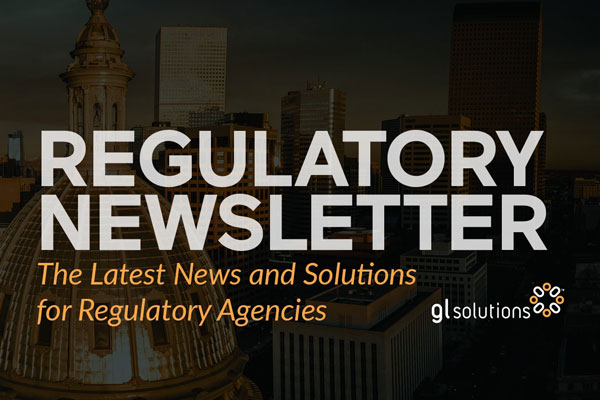We gathered the essential tips from three regulatory leaders to optimize your regulatory agency. Learn from Dennis Seavers, Executive Director of the North Carolina Board of Barber Examiners, Amy S. Westermann, Chief Counsel for the State Tax Commission of Missouri and James Collins, Former Director of the Delaware Division of Professional Regulation. Use their advice to start your agency’s transformation.
Dennis Seavers, Executive Director North Carolina Board of Barber Examiners
Use technology as a nerve center
“To be able to focus on our goals and measure our progress, we can’t be drowning in ‘minutiae’ – the sort of day-to-day small items that are important but can overwhelm us,” explains Dennis Seavers, Executive Director of the North Carolina Board of Barber Examiners. “We’ve turned to technology to help manage our workload, particularly by making services available online and using automation to reduce work and avoid the time-consuming consequences of human error. Technology also lets us assess processing times and identify choke points. Our staff than can then use technology to see what’s working and what needs improvement.”
Identity Risks with Data
According to Seavers, “being a model agency isn’t an abstruse concept or a form of Platonic idealism. The agency has to be able to measure its performance, identify weaknesses, and figure out how to avoid repeating mistakes. Like many agencies, we faced capacity issues during the pandemic, which stretched our resources in ways we didn’t expect. The pandemic prompted us to do a better job of identifying potential risks that negatively affect us and to manage those risks. That way, future events – even ones that seem unlikely – don’t prevent us from maintaining the public trust. We turned to data to identify our weaknesses. In this respect, our licensing database was both a solution (by reducing workload) and a source of ideas (by letting us see where we need to improve).”
Gain public’s trust as a model agency
“Government agencies are in a position of trust, and we need to constantly prove ourselves worthy of that trust,” says Seavers. “The public trusts us to use our powers appropriately, safeguard sensitive data, protect the public from harm, handle finances with solid internal controls, and act transparently. By striving to be a model agency, an agency justifies the public’s trust. How could we tell the public: “We don’t try to be a stand-out agency because we think it’s enough to achieve a level of passable competence”? Instead, we try to be a model agency because it gives us credibility with the public, with policymakers, and with auditors, and that reduces the sort of barriers and distrust that prevent us from achieving our goals.”
Amy S. Westermann, Chief Counsel State Tax Commission of Missouri
Implement a paperless system
“Although our team has always worked remotely some or all of the time, COVID forced us to reevaluate the manner in which we work with the data necessary to manage our caseloads,” says Amy S. Westermann, Chief Counsel State Tax Commission of Missouri. “An old adage in legal practice is “touch the file once.” Rather than keeping physical paper files in a centralized location where a team member would need to locate data and then copy or scan it for his/her own use and then refile the data, we decentralized access so that team members can access the data virtually from anywhere and keep the data in digital form.”
Take advice from peers
“The advice I would give to agencies looking to make this change,” explains Westermann, “is have a comprehensive or high-altitude vision of what you want your paperless system to do and how it should function. Study and reach out to other similar agencies that have made the change to paperless systems. Consider the hurdles and pitfalls they faced, which might be the same hurdles and pitfalls you will face and ask how they were overcome.”
Get stakeholder buy in
According to Westermann, “…changing hearts and minds was the highest hurdle to overcome in convincing the team that the total switch from paper to digital and e-files was long overdue. One method I used to make this change was to announce a date certain when all new files would be in digital form and all files prior to that date certain would remain in paper form. Creating this ‘deadline,’ which was tied to the start date of our appeal cycle, along with some basic training and instruction as to how the new digital documents and e-files would be maintained, helped build positive anticipation.”
James Collins, Former Director Delaware Division of Professional Regulation
Recognize value of regulatory work
James Collins, a former director of the Delaware Division of Professional Regulation, reflected on his motivation to improve the agency during an interview with the Council on Licensure, Enforcement & Regulation. “And I think that’s the thing that we really tried to focus on in these modernizations, that there are people’s lives on the other end of the applications that we’re getting these renewals, that we’re getting these licenses, investigations—there are literally people’s lives. People can’t work without the work that we do, and the public can’t be safe without the work that regulatory agencies do. So, the work is important.”
Further Reading
State government application modernization under stress
Article reveals the results from the 2022 State CIO Application Modernization Report, including why to modernize now.
Is your regulatory agency striving to be the best?
What motivates regulatory leaders to improve their agency? And what does the ultimate agency look like? Learn why leaders choose to transform their agency, as well as the resources they use on their journey towards a model agency.
How to become a model regulatory agency
Take our quiz to discover your agency’s phase of development towards a model agency.
Why Modernization is Just the Start
The American Rescue Plan Act provides funds and highlights the need to modernize regulatory software. And as a regulatory agency you strive to modernize the way you serve the public, as well as the way you run your agency. However, along with modernizing, your agency must also continually transform to meet the ever-changing demands of the public, the workplace and your state legislature.
Get in touch
GL Solutions helps governments run, grow and adapt. To learn more, explore our website, call us at (971) 337-2659 or email us at hello@glsolutions.com.


